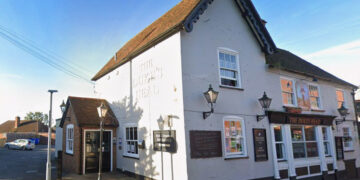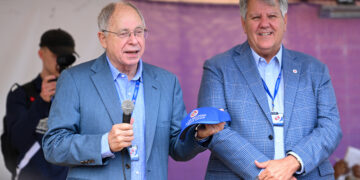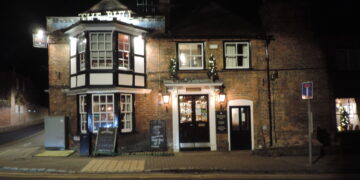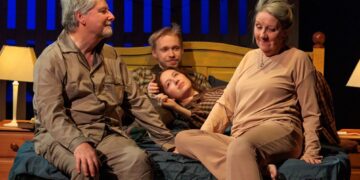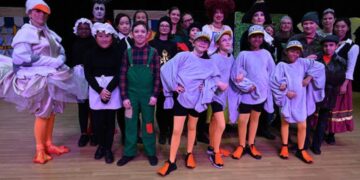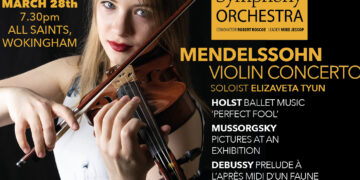THE MILL at Sonning is Brian Blessed’s Shangri La – he’s certainly got the bug for the dinner theatre. This is his third year in a row for directing a play here and he’s also appeared at several Audience With… events and attended supporters gatherings too.
This is a man with a passion.
“It’s such a kind of privilege to come here. And Sally Hughes and her staff are just mind-blowingly wonderful, you know,” he says.
He’s back this year to direct a new take on Agatha Christie’s Unexpected Guest, something that he says is a fine romance.
But the connection with Christie goes back quite some way: it goes back to his days in rep.
“I miss that kind of magic of those plays and theatre,” he says, reminiscing.
“While I was at Nottingham, I was an assistant stage manager and had small parts for £4.19s.6d a week. And I was building the sets, mapping them out, stoking the coke ovens, doing the lighting, prompting and gathering props. I did everything.
“I was alone one day in the theatre at Nottingham and the door opened and here was this tall figure. ‘Excuse me, I’m terribly sorry you know, because we’re doing Spider’s Web’, he says.
“The figure said: ‘I just thought I’d call in, my name is Agatha Christie. In actual fact my name is really Clarissa, I much prefer to be called Clarissa, my second name.’
“I said I was Brian Blessed, she said, ‘’What a lovely name’. And it was the beginning of a very short but lovely friendship. Everybody was jealous of it in the Company. And so she accompanied me up and down Nottingham, Mapperley Road and Maid Marion’s Way, collecting props. And we found an old piano in the theatre in the dungeon part of the theatre, all rusty, and she played me Clair De Lune on it.”
And the pair spent time together, exploring the arboretum. While they walked together, “She talked about her life and she’d talk about the war years and she was a nurse during the Blitz. She also made tremendous study of poisons etc and was always up to date on the latest poison. And saying ‘There is a poison at the moment Mr Blessed’ or Brian as she called me, ‘you can put it in people’s tea and it’ll take about 10 weeks to kill them and it’ll leave no traces of the poison’.
“At that particular point in our conversation, I exchanged my teacup with her teacup and I think – you can drink mine, I’ll drink yours. She roared with laughter at this.”
Christie’s travels
She also talked about her relationship with her husband, and how she’d followed him around the East and the Middle East on archeological digs.
“She adored going on digs, she adored history, so a lot of her plays, like Egypt, Egyptian plays in Mesopotamia – it was all from her research being with her husband.”
And she also opened up to Brian about her mental health.
“She had had two or three nervous breakdowns she said and she said ‘A writer can’t stop writing and writing, it’s very hard to still my mind, it’s always reverberating, it’s very difficult for me to shut off the lights of rooms in my brain’ she described it. But she said that in particular, she had been hurt by a play called Verdict.
“And the critics had been very, very, very rude about her play Verdict, in London. And they’d booed every scene on the first night.
“They even recommended her writing another play which should have her death knell in it where she dies. And she was horribly hurt by that. She went away for a few weeks and buried herself away and with great guts and determination came back with The Unexpected Guest. And that ran for several years in the West End, so she came back triumphantly, great courage. But she did have, she was obsessed with dreams. She loved all that – fairy stories and things like that.”
The pair got on, by his own admission, marvellously.
“At the end of my time with her she gave me a little radio in leather and unfortunately somebody stole it from my bed sitting room. Very sad.
The knight in armour in Spider’s Web
“I found her absolutely inspirational, a brilliant mind and we got on marvellously. She liked my imagination, she liked my love of foreign countries, she liked my love of adventure and she was an adventurer. So therefore, she also always said you know, that we were doing Spider’s Web, it had been done in London with Margaret Lockwood and she wasn’t quite satisfied with it, and she said to me ‘When you do Spider’s Web, do put a knight in armour in it that kills people.’ And in my production here last, the Spider’s Web, I had this seven-foot knight on the set, which at one point comes to life and kills a villain. But the murderer is inside the armour and you have to guess who he is. So I put that in because she wanted it.”
Animals and Agatha
And his latest play is more than just a murder mystery.
Brian explains: “The Unexpected Guest opens up a whole can of beans, particularly at the moment, with animal welfare being a big issue in the world, and elephants being shot, and rhinoceros. A lot of our animals are on the verge of extinction. This is a theme very much in The Unexpected Guest. But I have to say, it is, I think, her most mysterious play, it has great mystery and the critics adored it.
“It’s got great mystery. But it is above all a romantic story. It’s a romance.
“I am giving all these young people [in the cast], particularly our two lovers, the most wonderful notes about love and being in love, so it’s about love and mystery and intrigue and it is a masterpiece of writing.”
He added that Unexpected Guest was one of Agatha Christie’s favourite plays.
Brian thinks that the Mill’s staging will please her, not least because of the carpentry of the theatre.
“The sets here, the workshop here is masterful. They’re solidly built 4ft by 4ft wood, and they’re real. You’re in a real room and I think it’s very important, particularly with Christie, that the people come here and there is a gasp from the audience when they see the set. And on all the two occasions before, I’ve had that effect. This one is more so and it’s very exotic. It’s almost like being in Kenya and therefore you can see with rhinoceros heads and elephant heads and gorillas and you know what and it’s just part of the set, because the central character who was a riot, was a big game hunter.”
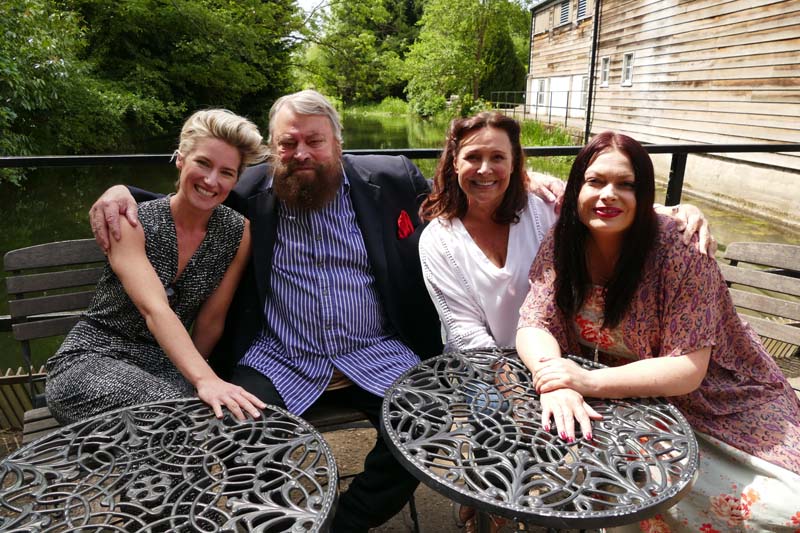
“This game element runs through the play and he feels that Christie was ahead of her time in this respect.
“The whole issue of hunting animals which now, today, is more so, particularly President Trump – he encourages hunting for wild animals.
“So you see it’s set in the 50s and the thing is that we have only recently realised fully the importance of animals and that if they die out what will affect us. What if bees die out etc and apparently if bees die then we die etc – the chain reaction.
“It’s now a big thing because the rapid decline of wild animals is frightening. And Christie seems to see that future in this play. While one mustn’t be a prophet of doom, she was an optimist and I’m an optimist, I think we’re going to make it.
“We are the guardians of this planet, and she touches on all those things in this play, and within the mystery.”
Brian Blessed and the Yeti
And this influences Brian and his attitude to animals and what he chooses to do now:
“[Producers would] say, “Brian,” you’re going, “you’re mostly to go on the Yeti expedition.” The Yeti is called Yeti, in the Middle East, the Far East, and Bigfoot, in Canada, Sasquatch.
“It is called Orang Pendek. Orang Pendek, upright man, not orangutan. Orang Pendek, in Sumatra, where the BBC are busy doing great surveys. So this creature, there’s so many unknown creatures we haven’t come across, and people will say, “Well, Brian, if you go on a Yeti expedition, because you look like a Yeti.”
“I say, “Well, I’m very reluctant to, because it would seem that there is evidence that they do exist.” Not being stupid, but they do exist, in Sumatra, in particular. But would immediately want to put it in a cage!
“This poor creature, if it was found, we’d put it in a cage! And the cage, principally, is still employed very powerfully throughout the world.”

The Unexpected Guest is a romance
But there’s more to The Unexpected Guest than animals.
“The play doesn’t beat you over the head with animal conversation. It is a romance. It’s about love, and it’s about mystery, and I challenge anybody to work out who the murderer is.
“I hope, in the way we’re directing it, that you don’t. Now I’d think the audience will go away very satisfied. It is wonderfully romantic. I’m going to use music on an epic scale in it, romantic music, jungle music, and all kinds of music. I think that The Unexpected Guest, this time, will be ever so different from the way it’s been done before.
“I’m doing it the way she wanted it. She always said, “Fill the scent with animal heads, of this hunter who kills them.” So the scent is going to be exactly that, and I hope the set will impress, and I think people will have a fabulous evening.”
But there’s also the process of guessing who the murderer is.
Brian is excited at the prospect of the audience not being sure who the villain of the piece is.
“Yes. There are red herrings in this throughout. Goodness, come to this theatre with a fishing net, and cast the fishing net all over the bloody stage, you still might not catch the murderer.
“It’s interesting that audiences come, a lot of them take out notebooks, and they start taking notes! I’ve told the cast not to be put off by this.
“A lot of Agatha Christie people haven’t read Unexpected Guest, you know, so they’re writing down who they think it is. Is it the butler? Is it this? Is it that?
“This play is full of red herrings.”
Diamond jubilee
This is the 60th anniversary of the play, but the book wasn’t novelised until recently, and Brian says the audience will get a huge shock when the murderer is unmasked.
And he can’t wait to see their reactions.
“I learn so much from the audience. I don’t think they’re idiots. Quite the reverse. I don’t underestimate them. They’ll see me sitting there, and they’ll give me notes: “Oh, this is wonderful, oh, lovely!” And then, “I think it’s really brilliant!” “I think, it’s, oh, I think it’s this and that and the other,” and, “Oh, isn’t this wonderful?”, and all that.
“I remember the last one. There’s a young man in it who’s with the elders, middle-aged, and he’s their guest in the country house, and playing golf with them and everything. And he dances, you know, the leading lady at one point, and plays games with a sweet little girl, and everything else. As I said, this knight in armour, I had it moved to … I put things in, I put music in, and I put things in from the era.
“This knight, when it moved suddenly, when no one’s around, and it kills a burglar in a spider’s web. I then did the words: “Bogeyman, don’t let him get too close to you. He’ll catch you if he can.” And the knight came to life and killed the burglar.
“So right at the end of the play we had a young man in it, when he’s being interrogated, the police take him apart, he’s so useless. As he leaves the room, he’s so upset he got it all wrong, he bashes his knee into the bloody chair. He’d no sophistication in handling the police at all, and the audience adored him.
“Then right at the end, the little girl, the victim is on the stage. Then next thing … And it’s the end of the play, and it goes a bit dim and the door slightly opens to, “Hush, hush, hush. Here comes the Bogeyman. Don’t let him get you.
“And the door opens, and it’s this young man. The whole audience went, ‘Oh, no, no, no’.
“They adored him. They loved him. He’d had them laughing. They loved him, ‘cause he was sweet and kind, and he’s the murderer. That’s the effect I want to get.
“People go, ‘I knew it was that person, I knew it. I didn’t see it. It couldn’t have been. How? How did he? What?’”
Blessed and guns
And there will be a Blessed twist in the interval too.
“I shall have in the interval five minutes of two members of the cast playing games on the stage.
“They’ll be watching Muffin the Mule, because it’s a boy with his minder, and they’ll be watching the 1950’s television, Muffin the Mule, and have things like that. They will then do a little cowboy scene.
“What is interesting is, when I was a child, was that our favorite cowboy … we had Johnny Weissmuller, who was a wonderful Tarzan … but we had, in the films, regularly, films of Hopalong Cassidy, which was William Boyd, who was probably the most handsome man that ever lived.
“He had white silver hair, a black outfit, white horse, white six shooters. The gun is so mesmerising in our society, it’s one of our great problems. We all wanted a gun as kids.
“The gun problem stems from our childhood, not just in America, everywhere. We had wooden guns, we made little wooden guns. We made them out of reeds, until they appeared in the shops, but we wanted a gun like Hopalong Cassidy, and Shane.
“Where they’re watching television, you’ll hear, which is a shock for the audience and everybody, “And now that’s Muffin the Mule, and the afternoon film is, and here we have your hero, William Boyd as Hopalong Cassidy, in The Unexpected Guest.’
“There was a cowboy film. I’ve got posters I’m going to have in the theatre of The Unexpected Guest with William Boyd.
“So, the gun is the symbol of hunting of animals.
“We have the aspects of Shane in this. So I want them, in the interval, the sweet little lad who’s a bit backwards with his sweet woman minder, with their little toy guns.
“There is a love of guns, and all this is explored in The Unexpected Guest.”
‘My religion is youth’
Being a director of the cast is also something that pleases Brian.
He said: “I’m loving being with these young people. My religion is youth. I love young people. I sometimes feel that the elder middle age, not all of them, and the old people in the world, politicians, et cetera, are rather frightened and jealous of young people and their big wide eyes. Because I welcome them, and honour them.
“The heroine in this, it’s a fabulous part. I think that I’ve always lied to women. A lot of men just want to go to bed with women, and don’t necessarily liked them. But I’ve always liked women. So I’m delighted that the ladies are emerging everywhere, that we need them, and their brilliant minds. I absolutely adore and like women.
“Apart from a few men, what I’ve learned in life, I’ve learned from women,” he confesses.
“I’m outspoken this way, always.”
Somehow, I don’t think we’d have him any other way.
The Unexpected Guest runs at The Mill at Sonning from Thursday, June 7 to Saturday, July 28. Tickets cost from £55 and include a meal before the show. For more details, or to book call 0118 969 8000 or log on to www.millatsonning.com



